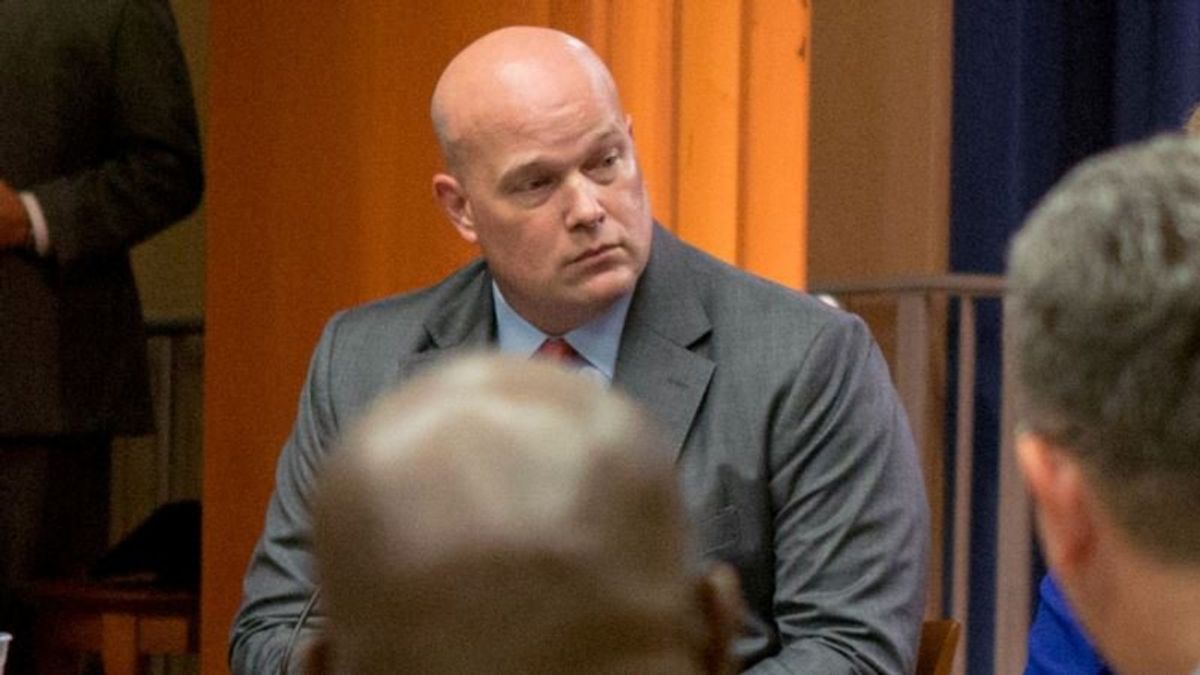
Congressional Showdown Over DOJ’s Whitaker Heats Up
Congressional Showdown Over DOJ's Whitaker Heats Up

With the exit of Jeff Sessions as attorney general, a potential showdown with newly energized congressional Democrats over the investigation of Russia's involvement in the 2016 presidential election appears to be gaining momentum.
The Washington Post on Thursday, citing sources close to acting Attorney General Matthew Whitaker, reported he has no intention of recusing himself from overseeing the special counsel probe of Russian interference in the 2016 election because of comments he made about the investigation in his private capacity. Whitaker was Sessions' former chief of staff.
The same sources also told the Post they do not believe he would approve any subpoena of President Donald Trump as part of that investigation.
White House counselor Kellyanne Conway told reporters Thursday she saw no reason that Whitaker should recuse himself.

"I don't know why he'd be recused. I'm not recused. You're not recused," she said.
But in an opinion piece published online Thursday in The New York Times, Conway's husband, George Conway III, called Whitaker's appointment by the president "unconstitutional."
"It's illegal," he wrote. "And it means that anything Mr. Whitaker does, or tries to do, in that position is invalid."
'Following regular order'
Asked whether Whitaker planned to consult Justice Department ethics experts on whether he should recuse himself, department spokeswoman Sarah Isgur Flores said, "We're following regular order here."
Whitaker served as U.S. attorney for the Southern District of Iowa from 2004 to 2009 during former President George W. Bush's administration. According to his LinkedIn profile, he headed Foundations for Accountability and Civic Trust (FACT), a self-described ethics watchdog, until September 2017, shortly before joining the Justice Department.
In an opinion piece for CNN.com in July 2017, two months after Robert Mueller's appointment, Whitaker wrote that the Mueller investigation had "gone too far," and urged Deputy Attorney General Rod Rosenstein, then overseeing the probe, to limit the special counsel's authority.

John Malcolm, a former federal prosecutor now with the Heritage Foundation, a conservative research group, said he saw no reason for Whitaker to step aside.
"He is the acting attorney general. He has no reason to recuse himself," Malcolm told VOA.
Malcolm said Sessions did "a solid job of implementing the president's law enforcement priorities." He praised Sessions for "protecting the integrity of the department and trying to keep it above politics."
Senator Lindsey Graham of South Carolina, a Republican member of the Senate Judiciary Committee and a close Trump ally, tweeted Wednesday that he looked "forward to working with President Trump to find a confirmable, worthy successor."
Graham has been floated as a possible candidate for the top post at Justice.
A Twitter announcement
In Washington, the firing of Sessions was long a question of when, not if.
Trump used Twitter to announce Sessions' resignation, thanked the former attorney general for his service, and named Whitaker as his interim replacement. Trump said he will announce a permanent nominee later.

The forced departure of Sessions, a 71-year-old former Republican senator from Alabama, and an early supporter of Trump's 2016 presidential campaign, capped a turbulent tenure that hit a rough patch weeks after he took office in February 2017 and recused himself because of potential conflicts of interest.
Trump blamed the recusal for the appointment of Mueller to lead the Russia investigation. Over Sessions' 20-month tenure, Trump frequently castigated him publicly for failing to rein in what he derided as a "witch hunt" led by Mueller and "17 Angry Democrats."
While shepherding a repeal of many Obama-era criminal justice policies, and steadfastly implementing Trump's tough-on-crime and immigration agenda, Sessions was increasingly shunned by the president in recent months. Trump told an interviewer in August, "I don't have an attorney general."
Previous attorneys general have also been fired. In January 2017, Trump fired then-acting attorney general Sally Yates after she refused to carry out Trump's controversial executive order barring travelers from six predominantly Muslim countries.
Congressional probe urged
Representative Elijah Cummings of Maryland, the top Democrat on the House Oversight Committee and a frequent Trump critic, urged Congress to investigate "the real reason" for the attorney general's "termination."
At a testy White House news conference earlier Wednesday, Trump was asked if he could stop the Mueller probe, in light of potential investigations by the newly empowered House Democrats.

"I could fire everybody right now," Trump responded. "But I don't want to stop it because politically, I don't like stopping it."
On Thursday, Democratic leaders on Capitol Hill, including Cummings, Representative Jerrold Nadler of New York, Representative Adam Schiff of California and Senator Dianne Feinstein of California sent letters to top administration officials demanding that all documents and materials relevant to the work of the Office of the Special Counsel or the firing of Sessions be preserved.
Whitaker was appointed under the Federal Vacancies Reform Act, a statute that allows the president to bypass the normal succession process and appoint any senior official of a department to head the agency in an acting capacity.
Whitaker would have to step down as acting attorney general if Trump decides to nominate him for the permanent position, said Mary McCord, a former acting assistant attorney general, and now a professor at Georgetown University Law Center.
In a statement issued late Wednesday, Whitaker did not address the question of recusal but said, "I am committed to leading a fair Department with the highest ethical standards, that upholds the rule of law, and seeks justice for all Americans."
Tags
US Politics Indictments? Final Report? White House Braces for MuellerNext PostUS Congress Breaks Race and Gender Barriers
Indictments? Final Report? White House Braces for MuellerNext PostUS Congress Breaks Race and Gender Barriers
THE REAL STATE OF THE UNION TONIGHT AT 7PM ET.
Record Stock Market highs. Border secured. Cartels crushed. “America is back.” This is MUST-SEE TV. Wall-to-wall LIVE team coverage starts TUESDAY at 7PM ET on the RAV network!







